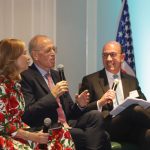David Neeleman: “Stop using TAP as a political weapon”
The former majority shareholder in airline TAP, David Neeleman, has asked the Portuguese government stop using the airline as a political “weapon”.
Instead, the entrepreneur who owns JetBlue said the government would be better off focusing on recovering tax payers’ investment (over €3Bn) in the airline.
David Neeleman is at the centre of a storm over an investigation by the Portuguese Public Ministry that that TAP ordered an entire fleet of over 50 new generation Airbus NEO and other aircraft at full cost after TAP had initially negotiated what were considered commercially untested aircraft at the at the time for a substantially lower price, thereby financially damaging the company.
Last week, the minister of Infrastructure Pedro Santos Nunes was in parliament for a hearing into the future privatisation process of TAP. At the hearing there was an exchange of various accusations, particularly with the main opposition PSD party, against the former private management of the airline.
In a written reply in reply to a request for a reaction by the news agency Lusa, the former TAP shareholder said: “Please stop using me and TAP as a political arm and focus your efforts on recovering the huge investment that in the meantime taxpayers were forced to make in the company”.
The consortium Atlântico Gateway — comprising shareholders Neeleman and the Portuguese entrepreneur Humberto Pedrosa — won the TAP privatisation competition completed by the PSD/CDS-PP government, an operation that was partially reversed in 2015 by the PS Government.
“The entire privatisation process and later shareholder reconfiguration were filly scrutinised by two Portuguese governments, Parpública (the public holding company that manages state-run enterprises and entities), the Tribunal de Contas (a public finances audit watchdog), the Portuguese Competition Authority, the National Civil Aviation Authority, among other entities”, states Neeleman.
At the hearing, Minister Nunes brought up the privatisation by the PSD/CDS-PP government whereby TAP was sold for €10 million to “a shareholder that got the company even more in debt”.
In a reply to the PSD MP Paulo Rios de Oliveira, who referred to a cash injection of €270 million made by David Neeleman – the minister said it was €224 million and that the PSD had not explained if it had effectively been a “capitalisation” or “an even greater debt” for TAP.
Paulo Rio de Oliveira accused the Government of not having told taxpayers that the €3.2Bn injected by the State were “an outright grant”.
Now, Neeleman argues (to Lusa) that when the Atlantic Gateway consortium, held by him and Humberto Pedrosa (50%-50%), won the privatisation bid for TAP in 2015 (he was the only serious contender at the time), “the company was completely under-capitalised and at risk of not paying the salaries”, and “at that time, under European rules, the Portuguese State was prevented from injecting any further funds into TAP”.
“For this reason, and contrary to the statements by the minister, Pedro Nunes Santos, it is not true that the Portuguese State had not to that point financed TAP, indeed, all of the company’s debt up until privatisation was guaranteed 100% by the State, and that was the only way (the airline) could get bank loans”.
David Neeleman also argues that during his tenure, “TAP had a solid liquidity of €500 million (above pre-privatisation levels), increased staff numbers by 18%, grew passenger numbers by 54% and business turnover by 39%, flight numbers by 21% and added 13 new destinations — seven of them in the very competitive United States market”.
On the issue of TAP’s debt, Neeleman states that before he became a shareholder, the company’s debt was 11x EBITDA, but that during his five-year tenure “TAP did not need a single euro from the Portuguese State and its debt no longer needed to be guaranteed by the State, falling to less than half it had been pre-privatisation by 5x EBITDA.
“In my various projects in the airline industry I have always met my obligations, acting in an honest and transparent way”.
“It is a great pity that the current government had chosen to impose my exit under the threat of TAP’s nationalisation. It is not true that it was the only solution and that it was down to the private shareholders to capitalise the company, as it could have easily understood from looking at its European counterpart airlines”.
“Actually, it’s never been like that in any airline company in the world. No company was prepared to withstand the pandemic”, he added.
Finally, on the question of the new aircraft bought at a higher price, David Neeleman insists “the acquisition process, which had the seal of approval of all involved, was scrutinised politically and technically, without any reservations or doubts being raised”.










